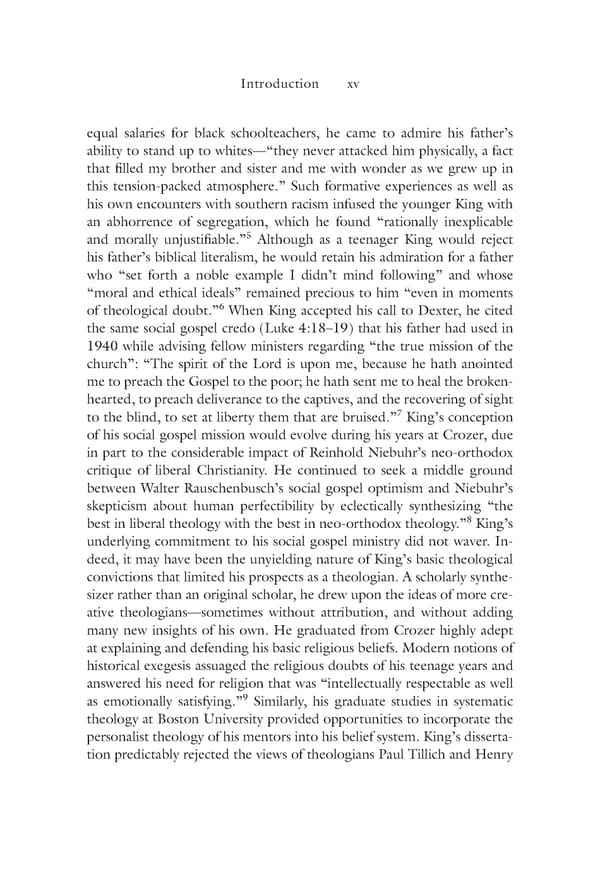Introduction xv equal salaries for black schoolteachers, he came to admire his father’s ability to stand up to whites—“they never attacked him physically, a fact that filled my brother and sister and me with wonder as we grew up in this tension-packed atmosphere.” Such formative experiences as well as his own encounters with southern racism infused the younger King with an abhorrence of segregation, which he found “rationally inexplicable 5 Although as a teenager King would reject and morally unjustifiable.” his father’s biblical literalism, he would retain his admiration for a father who “set forth a noble example I didn’t mind following” and whose “moral and ethical ideals” remained precious to him “even in moments of theological doubt.”6 When King accepted his call to Dexter, he cited the same social gospel credo (Luke 4:18–19) that his father had used in 1940 while advising fellow ministers regarding “the true mission of the church”: “The spirit of the Lord is upon me, because he hath anointed me to preach the Gospel to the poor; he hath sent me to heal the broken- hearted, to preach deliverance to the captives, and the recovering of sight 7 King’s conception to the blind, to set at liberty them that are bruised.” of his social gospel mission would evolve during his years at Crozer, due in part to the considerable impact of Reinhold Niebuhr’s neo-orthodox critique of liberal Christianity. He continued to seek a middle ground between Walter Rauschenbusch’s social gospel optimism and Niebuhr’s skepticism about human perfectibility by eclectically synthesizing “the best in liberal theology with the best in neo-orthodox theology.”8 King’s underlying commitment to his social gospel ministry did not waver. In- deed, it may have been the unyielding nature of King’s basic theological convictions that limited his prospects as a theologian. A scholarly synthe- sizer rather than an original scholar, he drew upon the ideas of more cre- ative theologians—sometimes without attribution, and without adding many new insights of his own. He graduated from Crozer highly adept at explaining and defending his basic religious beliefs. Modern notions of historical exegesis assuaged the religious doubts of his teenage years and answered his need for religion that was “intellectually respectable as well as emotionally satisfying.”9 Similarly, his graduate studies in systematic theology at Boston University provided opportunities to incorporate the personalist theology of his mentors into his belief system. King’s disserta- tion predictably rejected the views of theologians Paul Tillich and Henry
 Becoming King: Martin Luther King Jr. Page 15 Page 17
Becoming King: Martin Luther King Jr. Page 15 Page 17